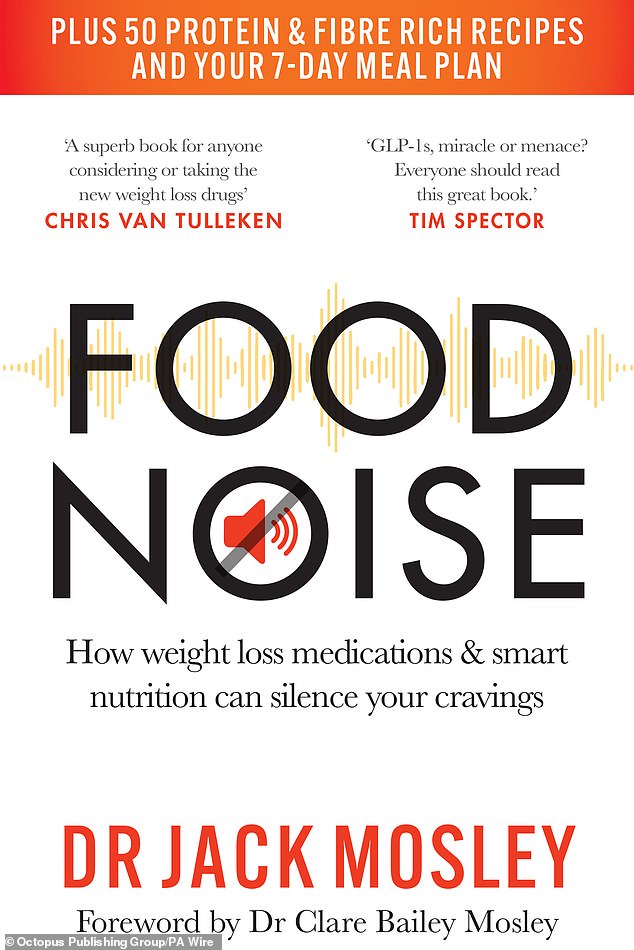It is rare for a drug to have such a huge and immediate impact as the new generation of weight-loss jabs – and even rarer for a new medication to appear to hold the answer to not just one medical problem, but many.
In the few short years since they were first catapulted into the headlines, drugs such as Ozempic and Wegovy have not only apparently transformed our battle with obesity, but could also cut the risk of heart disease, kidney failure, dementia, Parkinson’s disease and certain cancers.
There’s also the exciting possibility they may play a role in treating addictions.
Unsurprisingly, there has been a stampede to get hold of semaglutide (the generic name for Wegovy and Ozempic), as well as tirzepatide (brand name Mounjaro).
With demand so high, large parts of the market – particularly online – have become a lawless Wild West, where it’s easy to buy these weight-loss jabs without any kind of medical or nutritional support.
As a doctor, this is a situation that causes me great concern (and it’s why I’ve written a book, Food Noise, to explain the pros and cons of the drugs and, crucially, the lifestyle and dietary changes needed to use them safely – but more on this later).
There is clearly a place for these drugs – my dad saw the jabs as a real game-changer and was excited by their potential to help people who struggle with their weight, hailing them as ‘quite remarkable’ compared with previous weight-loss drugs.
Dad would never recommend something he wasn’t willing to try himself. I think one of the reasons he was so popular, to judge by the outpouring of grief that followed his passing, which blew us away, was that he was such a self-experimenter.

Dr Jack Mosley with his mother Dr Clare Bailey Mosley, a GP who has helped people to lose weight and put their diabetes into remission
Growing up, we thought what Dad did was normal, but Mum [Dr Clare Bailey Mosley] had to put her foot down on a few more dangerous ideas he had, such as being waterboarded (though the day he met my brother Alex’s future in-laws for the first time, they asked what he’d been doing and he said he’d been testing out mustard gas on himself).
So it’s obvious to ask: would he have tried the jabs himself at some point, in the name of science?
I don’t know the answer, but there’s no doubt we badly need a solution to obesity, which is fuelling the biggest health crisis of our generation, as I regularly see through my work as a doctor.
Two-thirds of adults in the UK are either overweight or obese – increasing their risk of heart disease, type 2 diabetes, high blood pressure, non-alcoholic fatty liver disease and some cancers.
And the problem is escalating. That’s because with our busy modern lifestyles, surrounded by high-calorie, processed foods designed to be enticingly moreish, it can be all too easy to gain weight – and so very difficult to shed it.
And I know this from personal experience. Although very skinny as an adolescent, I piled on 2st 5lb (15kg) in my first year as a junior doctor, quickly hitting 15st 10lb (100kg) – I’m over 6ft tall – on a diet of vending machine chocolate, poor quality canteen food and packets of sweets which I’d munch as I drove to and from work.
At home on the sofa, I’d happily scythe my way through a party-size bag of Doritos with a salsa dip in front of the TV.
My sweet tooth meant I needed two fillings within a year of beginning my job as a junior doctor, despite never having had one in my life. My girlfriend (now fiancée), a dentist, was not impressed.

Jack as a young boy with his father Michael Mosley, a medical journalist who died on the island of Symi while on holiday with his wife last summer
Dad also had a sweet tooth. Before he famously lost 1st 6lb (9kg) in two months in 2012 and reversed his type 2 diabetes on the 5:2 diet, he had a particular craving for milk chocolate.
I remember one Easter when I was around ten, running downstairs with my siblings to hunt for our chocolate eggs only to find they’d gone. Dad had eaten them all! If he didn’t have any chocolate, Mum would find him looking through the cupboards for any sort of sugary snack.
That all changed with the 5:2 of course. As a family we’re all mad about good food, although I have another admission: Mum is a great cook, but I was a fussy eater until the age of 18 or 19 and avoided most cooked veg. Even then I wouldn’t eat it unless it had been cut up into Bolognese (my sister was even worse; she had a list of five things she would eat, and lived mainly on chicken nuggets).
Luckily for me, when it was my turn to lose weight I was able to draw on having a family that emphasised the value of cooking nutritious food, and was gradually able to shed those extra kilos by cutting out the sweets and preparing meals ahead a bit more.
So I am all too aware of what a struggle it can be to lose weight. But are the new weight-loss jabs the magic bullet?
These drugs, called GLP-1 agonists, mimic the effects of a natural hormone called GLP-1 that regulates blood sugar and appetite. Currently the most popular are semaglutide and tirzepatide, which work in a similar way, reducing appetite, slowing down the digestive system and helping to control blood sugar levels.
What is particularly fascinating about GLP-1 jabs is they also seem effective at silencing ‘food noise’, the internal chatter many people – like me and my dad – experience when it comes to food, encouraging us to snack or overeat.
It’s the voice in your head that tells you to eat that chocolate bar (or chocolate eggs!) when you know you shouldn’t.

Food Noise by Dr Jack Mosley will be available from April 24. To order a copy you can go to mailshop.co.uk/books or call 020 3176 2937
Although most people hear food noise to some degree – it’s part of our gut-brain messaging that tells us we are hungry – in some people it’s intrusive and incessant. A study by WeightWatchers and the STOP Obesity Alliance found that 57 per cent of people who were overweight or obese experienced continued and disruptive food noise. I also suspect that food noise has been amplified by the fact food scientists have spent years finessing the perfect combination of refined carbohydrates, fats and flavourings to create a ‘bliss point’ of satisfaction that overloads the reward pathways in our brains, making processed foods irresistible.
The worst offending, highly processed junk foods contain the 2:1 ratio of carbohydrates to fats – the same ratio seen in breast milk – and include pizzas, cookies, chocolates, crisps and ice cream.
So how do weight-loss drugs silence food noise? One way they do this is by increasing feelings of fullness, which inevitably makes you less focused on food. They also activate brain areas that reduce our reward-seeking behaviours – which, in turn, reduces our consumption.
Incidentally, it’s this ability to influence reward-seeking behaviour that may explain reports that GLP-1 drugs can help treat addictions to alcohol or drugs.
They also act on the brain to reduce appetite dramatically, as well as improving the way the body metabolises fat – effectively turning white fat tissue, which just stores energy, into brown fat tissue, which is metabolically active and burns calories to produce heat.
Apart from weight loss, the drugs have been shown to dampen inflammation in the body – this is a state of low-level stress that can be damaging long term.
This may explain why they can cut the risk of diseases including heart disease. A study of more than 17,000 overweight or obese people conducted by University College London found a 20 per cent reduction in heart attacks, strokes or death in those taking semaglutide compared with the placebo group. Interestingly, this reduced risk was seen regardless of whether the participants lost weight – suggesting the result was due to another mechanism apart from weight loss.
But it’s not all good news. Like most medications, weight-loss drugs come with side-effects, which can vary from person to person, from the mildly inconvenient to the severe and dangerous. Nausea and vomiting are among the most common. ‘Ozempic burps’ (a specific type of sulphurous-smelling burping, possibly due to a slowed digestive system that leaves food to linger longer), constipation and diarrhoea are other typical side-effects.
There are reports of weight-loss ‘addiction’ – where people take things too far and become fixated on losing more weight – which is particularly concerning for those who are using the jabs but are already within the normal range. Slowing the movement of the gut can also slow the bowel to the point it temporarily stops working, causing obstructions that are very painful and can be life-threatening if not properly treated.
Other serious conditions linked with the drugs are acute pancreatitis (a painful and potentially fatal condition where the pancreas becomes inflamed) and thyroid cancer, although more research is needed to fully understand these possible risks.
You might be surprised to learn that another potential issue is malnutrition.
Doctors are now observing that people who rely very heavily on processed food are often both overweight and undernourished – coining the term ‘malnubesity’ for it. Studies show that 50 per cent of people with obesity have a nutritional deficiency of some sort – most commonly in vitamins A, B1 (thiamine), folate (B9) and D, as well as iron, calcium and magnesium. Many also have diets deficient in protein, fibre, healthy fats such as omega 3s, and important plant compounds such as polyphenols, which have powerful disease-fighting properties.
(Malnutrition can damage your health long term. For instance, magnesium deficiency is strongly linked with chronic inflammation, higher rates of depression and cardiovascular disease.)
You may, therefore, already be nutritionally deficient when you start taking a weight-loss drug – but without the proper diet and advice, it’s possible that matters will get worse as the drug reduces your appetite and you eat less.
Clearly these drugs are complex – and while they may effectively solve some big immediate health problems, they may also potentially store up others.
The other important factor is this: you need to have a plan for when you reach your target weight because, unfortunately, many people report that ‘food noise’ returns once they stop taking the drugs – and gradually the pounds start piling on once again.
Studies show that two-thirds of weight is regained by the end of the first year off the drugs, and while you’re more likely to lose muscle as well as fat, the regained weight is more likely to be fat. Losing muscle matters, because it helps you burn calories.
The fact is, if you haven’t learned any new eating habits, chances are you’ll revert to your old ones – and you’ll be back to square one.
Could you just stay on such drugs for ever? Apart from the cost, is this wise, given we don’t yet know if there are any health repercussions for long-term use?
My dad strongly believed that although weight-loss drugs offered an important tool in the battle against obesity, they were not the whole toolbox.
‘If you want to keep the weight off long term, you’re going to have to learn how to eat more healthily, how to exercise to maintain your muscle mass and how to use stress reduction techniques to help you when you feel under pressure,’ he said.
It was clear to him that the key to long-term success lies in learning to change your diet and lifestyle while you’re using these jabs.
This is what Food Noise, which is dedicated to my inspirational dad, is all about: offering a doctor’s advice, based on the best evidence, to help you decide if these powerful weight-loss drugs are for you, and then how best to use them if you do decide to give them a try.
Key to this is combining the jabs with a Mediterranean-style diet, which also offers high protein and fibre as well as bountiful supplies of fruit and veg, as a way of getting ‘the best of both worlds’, as my dad put it.
And it really does work – as the story of Dr Pawel Gadomski (see right), who at 24 st (152kg) used the jabs to kickstart his weight loss while at the same time starting on The Fast 800 diet. Four years later he’s still 10st lighter, thanks to the new lifestyle and diet.
To help more people like Pawel, Mum and I have adapted my dad’s successful Fast 800 diet plan to work alongside the jabs. It’s a three-stage plan that starts with a rapid weight-loss phase of between two to 12 weeks where you eat around 800-1,000 calories per day (followed by the intermittent fasting phase, restricting calories for two days a week, and then the maintenance phase for the long term) – with science-backed advice about which foods to eat if you do decide to try these powerful drugs.
The plan (which has delicious recipes from Mum) will not only ensure you’re properly nourished while using a weight-loss jab, but also help minimise side-effects such as constipation or diarrhoea – and help you get enough protein to ward off the loss of muscle. And once you reach your target, you’ll be well-placed to continue to live a healthy life – and keep the weight off – in the future.
Don’t miss tomorrow’s Mail on Sunday where I’ll share practical advice on how to evaluate if these drugs really are for you, key foods to eat for success, as well as lifestyle habits that can help you improve your health and happiness long term.
Adapted from Food Noise, by Dr Jack Mosley (Short Books, £16.99), to be published on April 24 © Dr Jack Mosley 2025.







